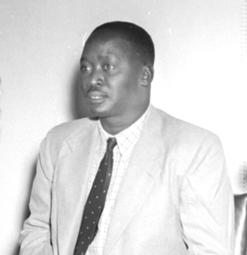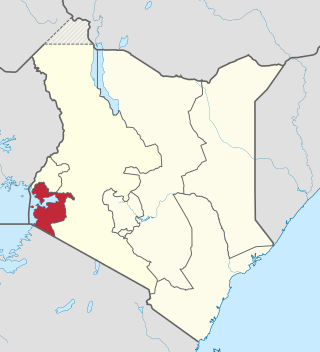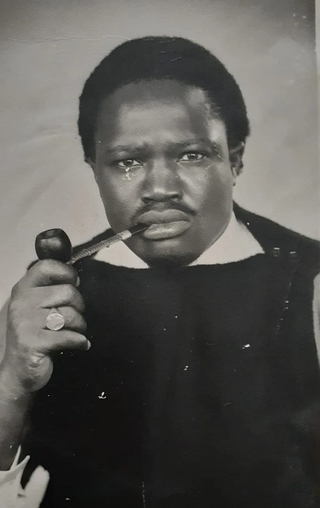
A part of Eastern Africa, the territory of what is known as Kenya has seen human habitation since the beginning of the Lower Paleolithic. The Bantu expansion from a West African centre of dispersal reached the area by the 1st millennium AD. With the borders of the modern state at the crossroads of the Bantu, Nilo-Saharan and Afro-Asiatic ethno-linguistic areas of Africa, Kenya is a multi-ethnic state. The Wanga Kingdom was formally established in the late 17th century. The Kingdom covered from the Jinja in Uganda to Naivasha in the East of Kenya. This is the first time the Wanga people and Luhya tribe were united and led by a centralized leader, a king, known as the Nabongo.

The Kenya African National Union (KANU) is a Kenyan political party that ruled for nearly 40 years after Kenya's independence from British colonial rule in 1963 until its electoral loss in 2002. It was known as Kenya African Union (KAU) from 1944 but due to pressure from the colonial government, KAU changed its name to Kenya African Study Union (KASU) mainly because all political parties were banned in 1939 following the start of the Second World War. In 1946 KASU rebranded itself into KAU following the resignation of Harry Thuku as president due to internal differences between the moderates who wanted peaceful negotiations and the militants who wanted to use force, the latter forming the Aanake a forty, which later became the Mau Mau. His post was then occupied by James Gichuru, who stepped down for Jomo Kenyatta in 1947 as president of KAU. The KAU was banned by the colonial government from 1952 to 1960. It was re-established by James Gichuru in 1960 and renamed KANU on 14 May 1960 after a merger with Tom Mboya's Kenya Independence Movement.

Jaramogi Ajuma Oginga Odinga was a Kenyan politician who became a prominent figure in Kenya's struggle for independence. He served as Kenya's first vice-president, and thereafter as opposition leader. Odinga's son Raila Odinga is a former prime minister, and another son, Oburu Odinga, is a former assistant minister in the Ministry of Finance.

Kisumu is the third-largest city in Kenya after the capital, Nairobi, and Mombasa. It is the second-largest city after Kampala in the Lake Victoria Basin. The city has a population of slightly over 600,000. The metro region, including Maseno and Ahero, has a population of 1,155,574 people according to the 2019 Kenya Population and Housing Census which was conducted by the Kenya National Bureau of Statistics.

The Kenya African Union (KAU) was a political organization in colonial Kenya, formed in October 1944 prior to the appointment of the first African to sit in the Legislative Council. In 1960 it became the current Kenya African National Union (KANU).

Thomas Joseph Odhiambo Mboya was a Kenyan trade unionist, educator, Pan-Africanist, author, independence activist, and statesman. He was one of the founding fathers of the Republic of Kenya. He led the negotiations for independence at the Lancaster House Conferences and was instrumental in the formation of Kenya's independence party – the Kenya African National Union (KANU) – where he served as its first Secretary-General. He laid the foundation for Kenya's capitalist and mixed economy policies at the height of the Cold War and set up several of the country's key labour institutions. Mboya was Minister for Economic Planning and Development when he was assassinated.

Nyanza Province was one of Kenya's eight administrative provinces before the formation of the 47 counties under the 2010 constitution. Six counties were organised in the area of the former province.

The Luo of Kenya and Tanzania are a Nilotic ethnic group native to western Kenya and the Mara Region of northern Tanzania in East Africa. The Luo are the fourth-largest ethnic group (10.65%) in Kenya, after the Kikuyu (17.13%), the Luhya (14.35%) and the Kalenjin (13.37%). The Tanzanian Luo population was estimated at 1.1 million in 2001 and 3.4 million in 2020. They are part of a larger group of related Luo peoples who inhabit an area ranging from South Sudan, southwestern Ethiopia, northern and eastern Uganda, southwestern Kenya, and northern Tanzania, making them the largest ethnic group in East Africa.

Bethwell Allan Ogot is a Kenyan historian and eminent African scholar who specialises in African history, research methods and theory. One of his works starts by saying that "to tell the story of a past so as to portray an inevitable destiny is, for humankind, a need as universal as tool-making. To that extent, we may say that a human being is, by nature, historicus.

Ramogi Achieng Oneko (1920–2007) was a Kenyan freedom fighter and politician, considered a national hero in Kenya.
The Kenya People's Union (KPU) was a socialist political party in Kenya led by Oginga Odinga. The party was banned in 1969.
Lady Whitehouse is a settlement in Kenya's Nyanza Province.

Gor Mahia Football Club, commonly known as K'Ogalo, is a football club based in Nairobi, Kenya. They have won the Kenyan Premier League a record 21 times, and have also won the FKF President's Cup a record 11 times. It is the first and only team from Kenya to win an African continental title to date, having won the African Cup Winners' Cup in 1987 after previously reaching the final in 1979.
The Kisumu massacre occurred when the presidential guard and police forces shot and killed several civilians in Kisumu Town, the capital of Nyanza Province in Kenya. This took place on 25 October 1969. The official death toll from government sources stands at 11 fatalities but other sources place this number at closer to 100. Victims included women and children, some of whom were shot 30–50 km away from the epicentre of the riots. According to media reports, the government of the day attempted to cover up the extent of the massacre.

The presidency of Jomo Kenyatta began on 12 December 1964, when Jomo Kenyatta was named as the 1st president of Kenya, and ended on 22 August 1978 upon his death. Jomo Kenyatta, a KANU member, took office following the formation of the republic of Kenya after independence following his efforts during the fight for Independence. Four years later, in the 1969 elections, he was the sole candidate and was elected unopposed for a second term in office. In 1974, he was re-elected for a third term. Although the post of President of Kenya was due to be elected at the same time as the National Assembly, Jomo Kenyatta was the sole candidate and was automatically elected without a vote being held. He died on 22 August 1978 while still in office and was succeeded by Daniel arap Moi.
Kondele is a district of the city of Kisumu, the third largest city in Kenya, and the second largest city, after Kampala, in the Lake Victoria Basin. Kondele is the most densely populated of the three satellite towns of Kisumu metropolitan region, the others being Maseno and Ahero. It is Kisumu City's most notable region and cultural identifier and one of the most densely populated regions in Kisumu County, Kenya. It lies on the A1 road that connects Kisumu and Vihiga. The town is administered by the Kondele County Assembly ward, an administrative ward which is part of the wards that represent Kisumu Central constituency in Kisumu county assembly. The ward is represented by the Kondele Member of County Assembly.

The 2018 Kenya handshake was a political truce made on the 9th of March 2018 between Kenyan President Uhuru Kenyatta and former Kenyan Prime Minister Raila Odinga. The two had been the leaders of opposing political factions amidst widespread political violence and civil unrest; they had previously faced one another in the contested 2017 Kenyan general election. Under the agreement, their political feud was resolved, with Kenyatta agreeing to support Odinga in the upcoming presidential elections. As a result, the Azimio coalition was formed, Uhuru became its chairman, and Odinga as the presidential candidate with Martha Karua as his running mate. They lost to William Ruto, who was Kenyatta's deputy at the time. They challenged Ruto's victory in the Supreme Court, however, Chief Justice Martha Koome said his claims did not meet the evidentiary threshold and dismissed the case. At a March 2023 protest in Nairobi they demanded an audit of the IEBC election servers.

Ochola Ogaye Mak'Anyengo, also known as George Philip Ochola (1930–1990) was a Kenyan trade unionist and Member of Parliament for Ndhiwa, South Nyanza, Kenya. He was involved in the fight for Kenya's independence and was a beneficiary of the Mboya-Kennedy airlifts.
The Nairobi People's Convention Party (NPCP) was a Nairobi based political party formed in 1957 by Tom Mboya. This party played a crucial role in the fight for Kenya's independence. Despite attempts at suppression from the colonial government, the NPCP managed to mobilise Africans in Nairobi to further the nationalist cause and fight for independence from Britain. Following Jomo Kenyatta's release from detention in 1961, the NPCP merged with the Kenya African Union (KAU) and Kenya Independence Movement (KIM) to form the Kenya African National Union (KANU).














